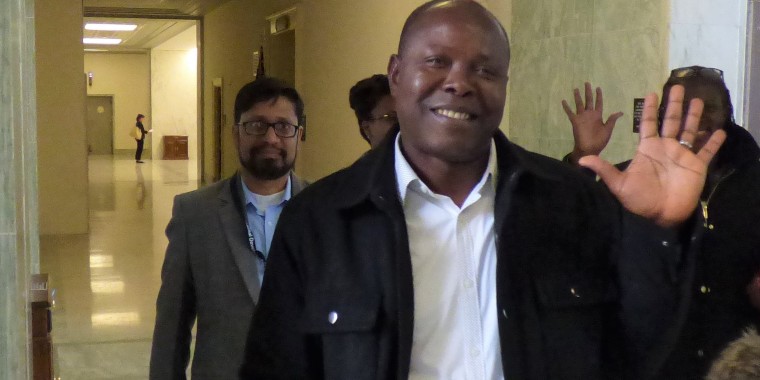After nearly dying from malaria as a child in Guinea, Dr. Lamine Bangoura says that it is fate that he is now working to combat the disease. Lamine is one of more than 50 Foreign Service Nationals (FSNs) who support PMI.
 After nearly dying from malaria as a child in the Guinean village of Kangoleah, Dr. Lamine Bangoura says that it is fate that he is now working to combat the disease.
After nearly dying from malaria as a child in the Guinean village of Kangoleah, Dr. Lamine Bangoura says that it is fate that he is now working to combat the disease.
Lamine joined the Guinea team of the U.S. President’s Malaria Initiative (PMI) as a malaria specialist in 2012, one year after Guinea became a PMI partner country. He had seen many malaria cases in his 11 years as a medical doctor, which pushed him to earn a master’s degree in tropical medicine from Japan. Prior to joining PMI, he consulted and led a variety of different public health initiatives such as HIV prevention, tuberculosis activities, and even female genital mutilation awareness.
Lamine is happy to be a part of PMI because he is able to provide assistance to those who are suffering from malaria and ultimately help achieve a malaria-free Guinea.
“With good collaboration and good coordination along with the availability of resources, I believe my country can achieve malaria control and later elimination,” he said.
Young children in villages across Guinea now have access to preventative medicine to protect them from malaria. Communities are being provided and educated on the benefits of sleeping under a bednet. There are respected community health workers who are engaged locally and are trusted to deliver health services. In a matter of four years, thanks in part to PMI’s contributions, there has been a significant decline in malaria cases from 44 percent in 2012 to 15 percent in 2016.
Lamine is one of more than 50 Foreign Service Nationals (FSNs) who support PMI. FSNs make up the largest portion of USAID’s workforce and are local hires who are usually of the same nationality as the host country.
Through a fellowship for FSNs, Lamine came from Guinea to meet with teams at USAID in Washington DC and the CDC in Atlanta in early 2020. While the COVID-19 pandemic cut his fellowship short, the FSN fellowship was still a good experience.
“It increased my knowledge of USAID and PMI and expanded my understanding of Agency headquarters’ perspectives and priorities for key PMI issues around budgeting, procurement, monitoring, evaluating, and reporting,” Lamine said. “It was also a great opportunity for me to network with other fellows and continue to grow professionally.”

Dr. Lamine Bangoura (middle) with other USAID Foreign Service Nationals during their fellowship in Washington, DC in early 2020.
Below Lamine reflects on his work with PMI:
In your opinion, what work that PMI supports currently has the biggest impact on communities in Guinea?
Involving faith-based organizations and religious leaders to be a part of malaria elimination. Training the leaders to relay key messages during Friday prayer for example has allowed us to reach populations that we couldn’t reach otherwise. Translating documents to Arabic or other languages when working with different communities also allows for easier access and better outcomes.
Country leadership is very important to the PMI, and FSNs are an essential member on every PMI team. How do you think FSNs strengthen PMI’s work?
FSNs are the backbone of PMI in the country. People come and go but FSNs are the ones who are based there. This is my country, so I need to help my country. As an FSN, I am able to help people and manage projects to be in line with PMI objectives and goals.
What changes have you seen to the malaria fight since joining PMI/Guinea in 2012?
Since 2012, great changes have been observed in the fight against malaria in Guinea. These changes are materialized by the increased availability of funds and anti-malaria drugs necessary for the care of patients at the level of health centers and at the community level. In addition, there has been improved organization of mosquito net distribution campaigns to protect the population from mosquito bites, the introduction of seasonal chemoprevention of malaria, an increase of awareness-raising activities, strengthened capacity of providers and staff of the National Malaria Control Program. Lastly I’ve seen a strengthening of the coordination between Guinea’s two main malaria partners, PMI and the Global Fund.
How has COVID-19 affected the malaria situation and PMI’s work in Guinea?
The pandemic has affected the treatment, prevention, and control of malaria, which is a major cause of death and disease in Guinea. In addition to some health workers becoming exposed or sick and the limitation of movements, many of our activities have been affected, including training activities, surveys, and case management. To minimize the impacts of the pandemic, Guinea’s National Malaria Control Program in collaboration with partners such as PMI developed a mitigation plan that has been integrated into the national recovery plan for the continuity of services. It is in the process of providing health workers with kits necessary for their protection.
When Lamine is not working to end malaria in Guinea, he enjoys hanging out with his friends, watching the news, and sometimes playing football, which his American colleagues know as “soccer.” He also loves going home to the small village he was born in, knowing that he is doing all that he can do to protect his family from malaria.
